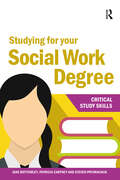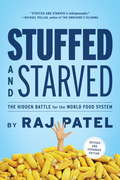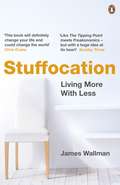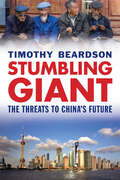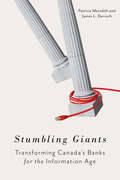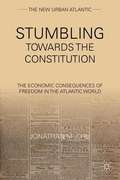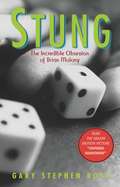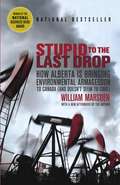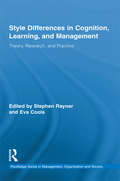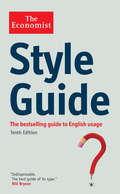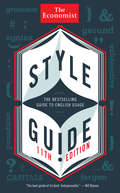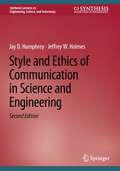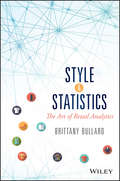- Table View
- List View
Studying for your Future Employability: A business student’s guide
by Sheila TylerHow employable will you be when you graduate from your business and management degree? How can you ensure that your time as a student is spent developing skills essential to the business world? Will you be poised to take on the job market with confidence and land your dream job? This study guide bridges the gap between your degree and your future career by connecting your study skills to the professional ones you’ll need. Designed to be a companion throughout your degree, this easy-to-use reference work simultaneously develops your employability whilst also helping you to succeed at university. Throughout your studies it will keep you focused on your future career by: teaching ‘bridging skills’ that enable you to apply your learning to professional practice showing how study skills such as diagnostics, planning and management, critical reading and knowledge transformation are used in the workplace demonstrating why ‘thinking skills’ such as critical thinking and reflection, developing arguments, problem solving, decision making, creative thinking and ethical thinking are vital to employers helping you to understand, early in your degree, what employers are looking for so that you can develop ‘career readiness’ as you study and gain work experience guiding you in developing a unique, evidence-based CV and using self-knowledge to make the right career choice. Studying for your Future Employability provides a range of scenarios and activities to demonstrate the links between study skills and professional skills, along with techniques familiar in the workplace. With IT skills embedded throughout, this is the perfect study skills textbook to accompany business and management students who want to make their time in education count.
Studying for your Policing Degree (Critical Study Skills)
by Martin Wright Jane Bottomley Steven PryjmachukStudying for your Policing Degree is PERFECT for anyone wanting to train to become a police officer. After reading this fully comprehensive guide you will understand: the structure and culture of HE, and how policing fits into it what to expect, and what will be expected of you, as a university student teaching and assessment methods within policing, so that you can perform to the best of your ability in an academic environment how to manage your policing studies in an effective way and make the most of the resources available to you. The books in our Critical Study Skills series will help you gain the knowledge, skills and strategies you need to achieve your goals. They provide support in all areas important for university study, including institutional and disciplinary policy and practice, self-management, and research and communication. Packed with tasks and activities to help you improve your learning, including learner autonomy and critical thinking, and to guide you towards reflective practice in your study and work life. Uniquely, this book is written by a subject specialist and an English for Academic Purposes (EAP) expert.
Studying for your Social Work Degree (Critical Study Skills)
by Jane Bottomley Steven Pryjmachuk Patricia CartneyStudying for your Social Work Degree is PERFECT for anyone wanting to train to become a social worker. After reading this fully comprehensive guide you will understand: the structure and culture of HE, and how social work fits into it what to expect, and what will be expected of you, as a university student teaching and assessment methods within social work, so that you can perform to the best of your ability in an academic environment how to manage your social work studies in an effective way and make the most of the resources available to you. The books in our Critical Study Skills series will help you gain the knowledge, skills and strategies you need to achieve your goals. They provide support in all areas important for university study, including institutional and disciplinary policy and practice, self-management, and research and communication. Packed with tasks and activities to help you improve your learning, including learner autonomy and critical thinking, and to guide you towards reflective practice in your study and work life. Uniquely, this book is written by an experienced social work lecturer and an English for Academic Purposes (EAP) lecturer.
Stuff I Wish I'd Known When I Started Working
by Fergus O'ConnellDon't learn the hard way--get work advice from some of the world's most successful people, all in one place!Work is a tricky business--the politics, the workload, the career ladder. It can take years and years of battling away and learning through mistakes to fully get to grips with the dos and don'ts. What if you could fast track that process? Cut out all those years of learning the hard way and working it out for yourself? Enter Stuff I Wish I'd Known When I Started Working, the unique guide to making work work! Fergus O'Connell has had a wonderfully varied career spanning three decades, and in this book, he will teach you the things it takes others years to figure out. You'll also find nuggets of wisdom and invaluable career advice from some of the world's most successful people--people like Oprah Winfrey, J.K. Rowling, Steve Jobs, Richard Branson and Jeff Bezos.Whether you're new to the workforce, changing roles, or just stuck in a professional rut, this book shows you what you need to know to get ahead. By learning from the common mistakes of others, you can avoid making those mistakes yourself--and possibly skip a few rungs on the corporate ladder.Quickly learn what others have taken years to work outGet nuggets of work wisdom from some of the world's most successful peopleLearn how to get more done in less time, and stimulate your creativityAim high, and get where you're going fasterYou'll spend the majority of your waking hours at work for the majority of your life. Make it time well spent. Learn how to be more effective, more accountable, more visible, and less afraid. If you want a seat on the bullet train to success, Stuff I Wish I'd Known When I Started Working provides the tips and tools you need. Buckle up.
Stuffed
by Doug Garr Hank CardelloFor more than thirty years, Hank Cardello was an executive and adviser to some of the largest food and beverage corporations in the world. For more than thirty years, he watched as corporate profits-and America's waistlines-ballooned: fattening consumers meant fattening profits. Now, in this fascinating and timely book, Cardello offers a behind-the-scenes look at the business of food, providing an insider's account of food company practices, failed government regulations, and misleading media coverage that have combined to place us in the middle of a national obesity epidemic. With insights culled from Cardello's time in the food industry, Stuffed explores how food companies have spent the last fifty years largely ignoring healthier fare in the name of their bottom lines while pushing consumers toward "convenience" food and supersize portions without considering the health consequences. From grocery aisles to restaurant booths to boardrooms, Cardello reveals the hidden forces that have long shaped your supermarket purchases and menu selections. He examines the black-and-white mind-set that has produced the carefully targeted marketing strategies that have maximized profits for the food industry and led to weight gain for you. But Cardello makes clear that the food companies should not take all the blame. They are merely a cog in a larger system that's broken, and here Cardello illustrates how the government and the media have only made it harder for Americans to make nutritious choices. Highlighting both bit players and high-profile voices of change, Cardello explains the fundamental risks to one-size-fits-all regulatory solutions and the bigger dangers posed by letting the food pundits confuse the health conversation. More than simply a chronicle of how we got here, Stuffed also puts forth a groundbreaking blueprint for the future of the food industry. In debunking the common myth that "healthier" has to mean higher costs and unpalatable tastes, Cardello provides novel but concrete steps that food companies can take to fatten their profits and slim down their customers. In addition, he stresses the realistic role that consumers must play in America's new health equation, explaining that unless they demand healthier food with their wallets, America will continue to tip the scales for years to come.
Stuffed and Starved
by Raj PatelCompletely updated and revised edition of one of the most widely-praised food books of recent years. It's a perverse fact of modern life: There are more starving people in the world than ever before, while there are also more people who are overweight. To find out how we got to this point and what we can do about it, Raj Patel launched a comprehensive investigation into the global food network. It took him from the colossal supermarkets of California to India's wrecked paddy-fields and Africa's bankrupt coffee farms, while along the way he ate genetically engineered soy beans and dodged flying objects in the protestor-packed streets of South Korea. What he found was shocking, from the false choices given us by supermarkets to a global epidemic of farmer suicides, and real reasons for famine in Asia and Africa. Yet he also found great cause for hope--in international resistance movements working to create a more democratic, sustainable and joyful food system. Going beyond ethical consumerism, Patel explains, from seed to store to plate, the steps to regain control of the global food economy, stop the exploitation of both farmers and consumers, and rebalance global sustenance.
Stuffocation: Living More with Less
by James WallmanOverwhelmed by the amount of 'stuff' you own? James Wallman is here to show you that you're not alone and there's a way to change that! 'Like The Tipping Point meets Freakonomics - but with a huge idea at its heart' Sunday Times We have more stuff than we could ever need - clothes we don't wear, kit we don't use, and toys we don't play with. It's bad for the planet, it's making us stressed, and it might even be killing us.In other words, we're stuffocated. From the exec who's sold almost everything he owns, to the well-off family who moved to a remote mountain cabin, a rising number of people are turning away from all-you-can-get consumption. Perfect for fans of Marie Kondo, Stuffocation is a manifesto for a vital change in how we all live, focusing less on possessions and more on experiences, and the one book you won't be able to live without.'This book will definitely change your life and could even change the world' Chris Evans'Particularly timely . . . [Wallman] is spot on' The Daily Mail 'Experientialism, as Wallman calls it, will define our future just as materialism has shaped our present' The Observer
Stumbling Giant: The Threats to China's Future
by Timothy Beardson“A thoughtful reconsideration of China’s actual place in the new world order, based on reality rather than fanciful speculation.” —Kirkus ReviewsCan anything prevent China surpassing the United States and becoming the world’s top superpower? While predictions that China’s rise to global supremacy is a near-certainty have resulted in this belief becoming almost conventional wisdom, this book boldly counters such widely held assumptions. Investment strategist Timothy Beardson brings to light the daunting array of challenges that today confront China, as well as the inadequacy of the policy responses. Threats to China come on many fronts, Beardson shows, and by their number and sheer weight these problems will thwart any ambition to become the world’s “Number One power.”Drawing on extensive research and experience living and working in Asia over the last 35 years, the author spells out China’s situation: an inexorable demographic future of a shrinking labor force, relentless aging, extreme gender disparity, and even a falling population. Also, the nation faces social instability, a devastated environment, a predominantly low-tech economy with inadequate innovation, the absence of an effective welfare safety net, an ossified governance structure, and radical Islam lurking at the borders. Beardson’s nuanced, firsthand look at China acknowledges its historic achievements while tempering predictions of its imminent hegemony with a no-nonsense dose of reality.
Stumbling Giants: Transforming Canada's Banks for the Information Age
by Patricia Meredith James L. DarrochCanada’s big six banks weathered the 2008 financial crisis very well. Their adherence to tried and tested twentieth-century products and services made them a safe harbour in the financial storm. However, as the modern global information economy continues to develop, the banks must confront their innovation crisis, or they will fail. In Stumbling Giants, Patricia Meredith and James L. Darroch embark on an audacious and startling examination of Canada’s big banks. With banks earning forty percent return on equity from traditional retail banking, pressure from investors with short term interests has discouraged technological innovation and adaptation. Meredith and Darroch reveal the socio-technological disruptors threatening the banks’ three primary product divisions – lending, wealth management, and payments – and offer innovative yet realistic recommendations for improvement. Meredith and Darroch’s new vision for the Canadian banking industry involves a broad cross-section of Canadians – policy makers, regulators, customers, suppliers, investors, and bankers – and is a call to action for all interested stakeholders to work together in creating a banking system for the twenty-first century.
Stumbling Toward the Constitution: The Economic Consequences of Freedom in the Atlantic World (The New Urban Atlantic)
by Jonathan M. ChuJonathan Chu explores individual economic and legal behaviors, connecting them to adjustments in trade relations with Europe and Asia, the rise in debt litigation in Western Massachusetts, deflation and monetary illiquidity, and the Bank of North America.
Stung: The Incredible Obsession of Brian Molony
by Gary Stephen RossHe was one of the brightest stars at the Canadian Imperial Bank of Commerce, a brilliant young banker on his way to the top. But Brian Molony had a secret obsession: he loved to gamble. The unsuspecting bank was soon fueling that obsession, as Molony helped himself to hundreds of thousands, then millions, of dollars in fraudulent loans. Despite falling deeper and deeper in the hole, Molony convinced himself he could win it all back. Before long, the mild-mannered assistant manager had become one of the biggest high-rollers the casinos had ever seen and earned himself a place in the annals of criminal history.
Stupid to the Last Drop: How Alberta Is Bringing Environmental Armageddon to Canada (and Doesn't Seem to Care)
by William MarsdenA bestselling investigative journalist takes a tour of the Alberta oil and gas industry, revealing how Canada's richest province is squandering our chance for a sustainable future.In its desperate search for oil and gas riches, Alberta is destroying itself. As the world teeters on the edge of catastrophic climate change, Alberta plunges ahead with uncontrolled development of its fossil fuels, levelling its northern Boreal forest to get at the oil sands, and carpet-bombing its southern half with tens of thousands of gas wells. In so doing, it is running out of water, destroying its range land, wiping out its forests and wildlife and spewing huge amounts of greenhouse gases into the atmosphere, adding to global warming at a rate that is unrivalled in Canada or almost anywhere else in the world. It's digging, drilling and blasting its way to oblivion, becoming the ultimate symbol of Canada's - and the world's - pathological will to self-destruct.Nowhere has the world seen such colossal environmental destruction as is being wreaked on Alberta. At one point the province even went so far as to consider a scientist's idea of nuking its underbelly to get at the tar sands. Stupid to the Last Drop looks at the increasingly violent geopolitical forces that are gathering as the world's gas and oil dwindle and the Age of Oil begins its inevitable slide towards oblivion. As Canadians deplete their energy reserves, selling them off to Americans at bargain-basement prices, no thought is given to conservation or the long-term needs of the nation.In this powerful polemic, William Marsden journeys across the heart of a province seized by the destructive forces of greed, power and the energy business, and envisions a very bleak future.From the Hardcover edition.
Sturdivant Electric Corp.
by Richard L. Nolan F. Warren McfarlanA unit manager on a field computer installation job is faced with recurring conflict between a programmer and his immediate supervisor.
Style Bible: What to Wear to Work
by Lauren A. RothmanFirst impressions (and second ones!) count, whether you are an intern or a CEO. Lauren A. Rothman addresses an age-old dilemma: how to be appropriate and stylish in the workplace. Based on a decade of experience in the fashion industry, she addresses the basics of fashion and executive presence by offering advice, anecdotes, and style alerts that help readers avoid major fashion faux pas at the office. Style Bible: What to Wear to Work is the must-have resource for the modern professional, male or female, climbing the ladder of success. Lauren identifies the ultimate wardrobe essentials, and reveals shopping strategies and destinations for the everyday person. Style Bible, complete with helpful illustrations, is the go-to manual on how to dress for every professional occasion and a valuable resource for understanding dress codes by industry, city, and gender so that your visual cues will make a strong impact. Make a commitment to being better dressed at work with Style Bible.
Style Bible: What to Wear to Work
by Lauren A. RothmanFirst impressions (and second ones!) count, whether you are an intern or a CEO. Lauren A. Rothman addresses an age-old dilemma: how to be appropriate and stylish in the workplace. Based on a decade of experience in the fashion industry, she addresses the basics of fashion and executive presence by offering advice, anecdotes, and style alerts that help readers avoid major fashion faux pas at the office. Style Bible: What to Wear to Work is the must-have resource for the modern professional, male or female, climbing the ladder of success. Lauren identifies the ultimate wardrobe essentials, and reveals shopping strategies and destinations for the everyday person. Style Bible, complete with helpful illustrations, is the go-to manual on how to dress for every professional occasion and a valuable resource for understanding dress codes by industry, city, and gender so that your visual cues will make a strong impact. Make a commitment to being better dressed at work with Style Bible.
Style Differences in Cognition, Learning, and Management: Theory, Research, and Practice (Routledge Studies in Management, Organizations and Society #10)
by Stephen Rayner Eva CoolsThis book aims to mark fifteen years of contributions to the field of style research in cognition and learning presented at the annual conference of the European Learning Styles Information Network. The style field is a multidisciplinary, global community made up of researchers in several domains of knowledge including education, psychology, business, computer science, information systems, management, human resources and other related fields. The book will be relevant for readers who are interested in differences in thinking and learning, covering a wide range of style-related themes with appeal to readers seeking an international and interdisciplinary perspective. Interested practitioners will include professionals working in the areas of HR Management, Organizational Learning, Business Management and all phases of Education. The application of style differences, for example, impacts widely upon work and human performance in areas of policy-making, team-management and project development (sports, social agency, and medicine). New or alternative research paradigms facilitating revision and consensus in the field of style differences are presented. The aim of integrating research and practice is developed to achieve consensual theory for style differences in human performance. Style Differences in Performance is a timely and field-defining volume that will change the way academics and practitioners across international and disciplinary boundaries think and talk about the field of learning style and its implications for human achievement.
Style Guide
by Bill BrysonThis expanded tenth edition of the bestselling guide to style is based on the Economist's own updated house style manual, and is an invaluable companion for everyone who wants to communicate with the clarity, style and precision for which the Economist is renowned. As the introduction says, 'clarity of writing usually follows clarity of thought. ' The Economist Style Guide gives general advice on writing, points out common errors and clichés, offers guidance on consistent use of punctuation, abbreviations and capital letters, and contains an exhaustive range of reference material - covering everything from accountancy ratios and stock market indices to laws of nature and science. Some of the numerous useful rules and common mistakes pointed out in the guide include: *Which informs, that defines. This is the house that Jack built. But: This house, which Jack built, is now falling down. *Discreet means circumspect or prudent; discrete means separate or distinct. Remember that "Questions are never indiscreet. Answers sometimes are" (Oscar Wilde). *Flaunt means display, flout means disdain. If you flout this distinction you will flaunt your ignorance *Forgo means do without; forego means go before. *Fortuitous means accidental, not fortunate or well-timed. *Times: Take care. Three times more than X is four times as much as X. *Full stops: Use plenty. They keep sentences short. This helps the reader.
Style Guide
by The Economist Newspaper Ltd.This expanded eleventh edition of the bestselling guide to style is based on the Economist's own updated house style manual, and is an invaluable companion for everyone who wants to communicate with the clarity, style and precision for which the Economist is renowned. As the introduction says, 'clarity of writing usually follows clarity of thought. ' The Economist Style Guide gives general advice on writing, points out common errors and clichés, offers guidance on consistent use of punctuation, abbreviations and capital letters, and contains an exhaustive range of reference material - covering everything from accountancy ratios and stock market indices to laws of nature and science. Some of the numerous useful rules and common mistakes pointed out in the guide include: *Which informs, that defines. This is the house that Jack built. But: This house, which Jack built, is now falling down. *Discreet means circumspect or prudent; discrete means separate or distinct. Remember that "Questions are never indiscreet. Answers sometimes are" (Oscar Wilde). *Flaunt means display, flout means disdain. If you flout this distinction you will flaunt your ignorance *Forgo means do without; forego means go before. *Fortuitous means accidental, not fortunate or well-timed. *Times: Take care. Three times more than X is four times as much as X. *Full stops: Use plenty. They keep sentences short. This helps the reader.
Style Guide (Economist Books)
by The EconomistThis expanded twelfth edition of the bestselling guide to style is based on The Economist's own updated house style manual, and is an invaluable companion for everyone who wants to communicate with the clarity, style and precision for which The Economist is renowned.As the introduction says, 'clarity of writing usually follows clarity of thought.'The Economist Style Guide gives general advice on writing, points out common errors and clichés, offers guidance on consistent use of punctuation, abbreviations and capital letters and contains an exhaustive range of reference material--covering everything from accountancy ratios and stock market indices to laws of nature and science.Some of the numerous useful rules and common mistakes pointed out in the guide include:Which informs, that defines. This is the house that Jack built. But: This house, which Jack built, is now falling down.Discreet means circumspect or prudent; discrete means separate or distinct. Remember that "Questions are never indiscreet. Answers sometimes are" (Oscar Wilde).Flaunt means display, flout means disdain. If you flout this distinction you will flaunt your ignorance.Forgo means do without; forego means go before.Fortuitous means accidental, not fortunate or well-timed.Times: Take care. Three times more than X is four times as much as X.Full stops: Use plenty. They keep sentences short. This helps the reader.
Style and Ethics of Communication in Science and Engineering (Synthesis Lectures on Engineering, Science, and Technology)
by Jay D. Humphrey Jeffrey W. HolmesThis book serves as a valuable aid for scientists and engineers who seek to discover and disseminate knowledge so that it can be used to improve the human condition. This book can be used as a textbook for undergraduate or graduate courses on technical communication and ethics, a reference book for senior design courses, or a handbook for young investigators and beginning faculty members.In addition to presenting methods for writing clearly and concisely and improving oral or poster presentations, this compact book provides practical guidelines for preparing theses, dissertations, journal papers for publication, and proposals for research funding. Issues of authorship, peer review, plagiarism, recordkeeping, transparency, and copyright are addressed in detail, and case studies of research misconduct highlight the need for proactive attention to scientific integrity. Ample exercises cause the reader to stop and think. The authors motivate the reader to develop an effective, individual style of communication and a personal commitment to integrity, each of which are essential to success in the workplace.
Style and Statistics: The Art of Retail Analytics
by Brittany BullardA non-technical guide to leveraging retail analytics for personal and competitive advantage, Style & Statistics is a real-world guide to analytics in retail. Written specifically for the non-IT crowd, this book explains analytics in an approachable, understandable way, and provides examples of direct application to retail merchandise management, marketing, and operations. The discussion covers current industry trends and emerging-standard processes, and illustrates how analytics is providing new solutions to perennial retail problems. You'll learn how to leverage the benefits of analytics to boost your personal career, and how to interpret data in a way that's useful to the average end business user or shopper. Key concepts are detailed in easy-to-understand language, and numerous examples highlight the growing importance of understanding analytics in the retail environment. The power of analytics has become apparent across industries, but it's left an especially indelible mark on retail. It's a complex topic, but you don't need to be a data scientist to take advantage of the opportunities it brings. This book shows you what you need to know, and how to put analytics to work with retail-specific applications. Learn how analytics can help you be better at your job Dig deeper into the customer's needs, wants, and dreams Streamline merchandise management, pricing, marketing, and more Find solutions for inefficiencies and inaccuracies As the retail customer evolves, so must the retail industry. The retail landscape not only includes in-store but also website, mobile site, mobile apps, and social media. With more and more competition emerging on all sides, retailers need to use every tool at their disposal to create value and gain a competitive advantage. Analytics offers a number of ways to make your company stand out, whether it's through improved operations, customer experience, or any of the other myriad factors that build a great place to shop. Style & Statistics provides an analytics primer with a practical bent, specifically for the retail industry.
Style and Substance: A guide for women who want to win at work
by Helena Morrissey'An inspiring guide to developing your personal brand, achieving your career goals and shaping the future of work' Red'Everything every career woman needs to know and yet is rarely shared so honestly' Anya Hindmarch'Refreshingly relevant and practical' Roksanda IlincicWomen have made great advances in the workplace, but despite that - and the overwhelming amount of career advice out there - the same questions continue to arise: how to succeed in a man's world, how to combine a career with a family, how to be authentic and fit in, and whether it is even possible to achieve a work-life balance while chasing career goals.Unfortunately, much of the advice women are offered is badly out of date and lacking in 'cut-to-the-chase' strategies that really tally with their experience of the workplace now. What's more, the advice often tends to be defensive, focused on overcoming obstacles rather than drawing upon strengths.Style and Substance starts from a very different perspective. Written by Helena Morrissey, who has learned through her own experiences as a woman in the workplace and as a business leader,it will help you understand what really matters when it comes to career progression today, whatever your age, situation and aspirations.Style and Substance will show you how to build your own style - your personal brand - and how to have confidence in it, and in yourself. Once you realise how much agency you have and the steps that you can take to look the part, sound the part, feel the part and therefore be the part, you'll be empowered to achieve your goals in your own way, secure in who you are and what you have to offer.
Style and Substance: A guide for women who want to win at work
by Helena Morrissey'This is a kind book. Everything every career woman needs to know and yet is rarely shared so honestly' Anya HindmarchWomen have made great advances in the workplace, but despite that - and the overwhelming amount of career advice out there - the same questions continue to arise: how to succeed in a man's world, how to combine a career with a family, how to be authentic and fit in, and whether it is even possible to achieve a work-life balance while chasing career goals.Unfortunately, much of the advice women are offered is badly out of date and lacking in 'cut-to-the-chase' strategies that really tally with their experience of the workplace now. What's more, the advice often tends to be defensive, focused on overcoming obstacles rather than drawing upon strengths.Style and Substance starts from a very different perspective. Written by Helena Morrissey, who has learned through her own experiences as a woman in the workplace and as a business leader,it will help you understand what really matters when it comes to career progression today, whatever your age, situation and aspirations.Style and Substance will show you how to build your own style - your personal brand - and how to have confidence in it, and in yourself. Once you realise how much agency you have and the steps that you can take to look the part, sound the part, feel the part and therefore be the part, you'll be empowered to achieve your goals in your own way, secure in who you are and what you have to offer.
Style and Substance: A guide for women who want to win at work
by Helena Morrissey'An inspiring guide to developing your personal brand, achieving your career goals and shaping the future of work' Red'Everything every career woman needs to know and yet is rarely shared so honestly' Anya Hindmarch'Refreshingly relevant and practical' Roksanda IlincicWomen have made great advances in the workplace, but despite that - and the overwhelming amount of career advice out there - the same questions continue to arise: how to succeed in a man's world, how to combine a career with a family, how to be authentic and fit in, and whether it is even possible to achieve a work-life balance while chasing career goals.Unfortunately, much of the advice women are offered is badly out of date and lacking in 'cut-to-the-chase' strategies that really tally with their experience of the workplace now. What's more, the advice often tends to be defensive, focused on overcoming obstacles rather than drawing upon strengths.Style and Substance starts from a very different perspective. Written by Helena Morrissey, who has learned through her own experiences as a woman in the workplace and as a business leader,it will help you understand what really matters when it comes to career progression today, whatever your age, situation and aspirations.Style and Substance will show you how to build your own style - your personal brand - and how to have confidence in it, and in yourself. Once you realise how much agency you have and the steps that you can take to look the part, sound the part, feel the part and therefore be the part, you'll be empowered to achieve your goals in your own way, secure in who you are and what you have to offer.


